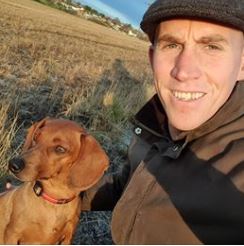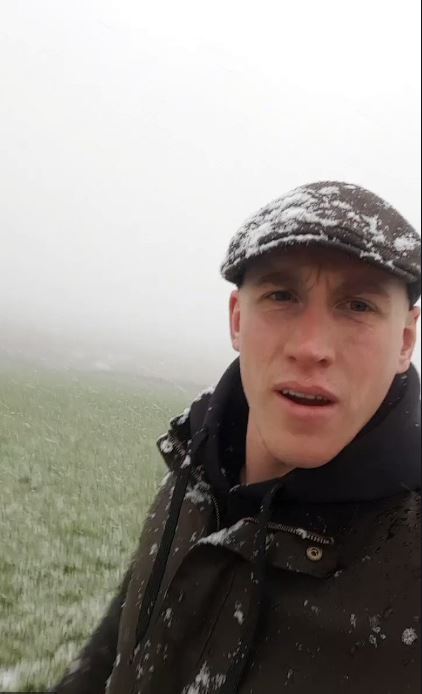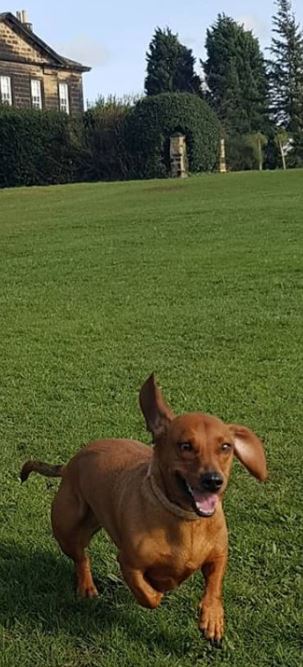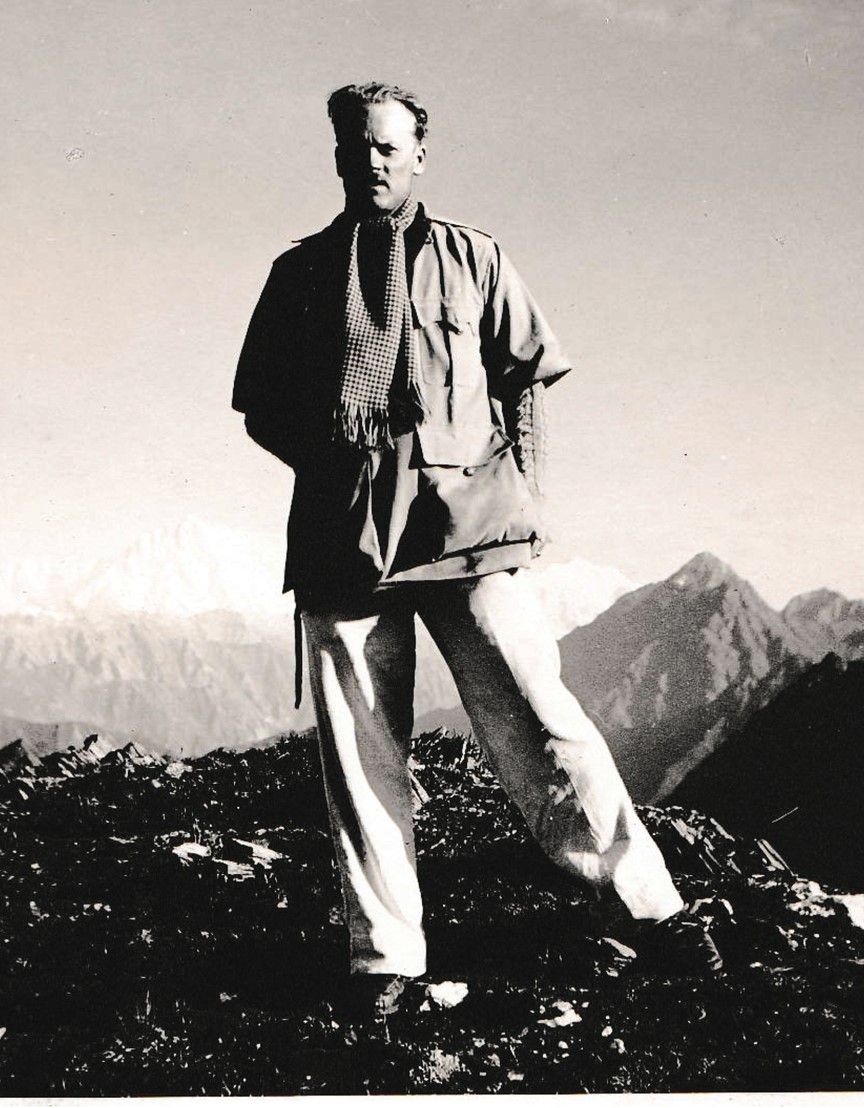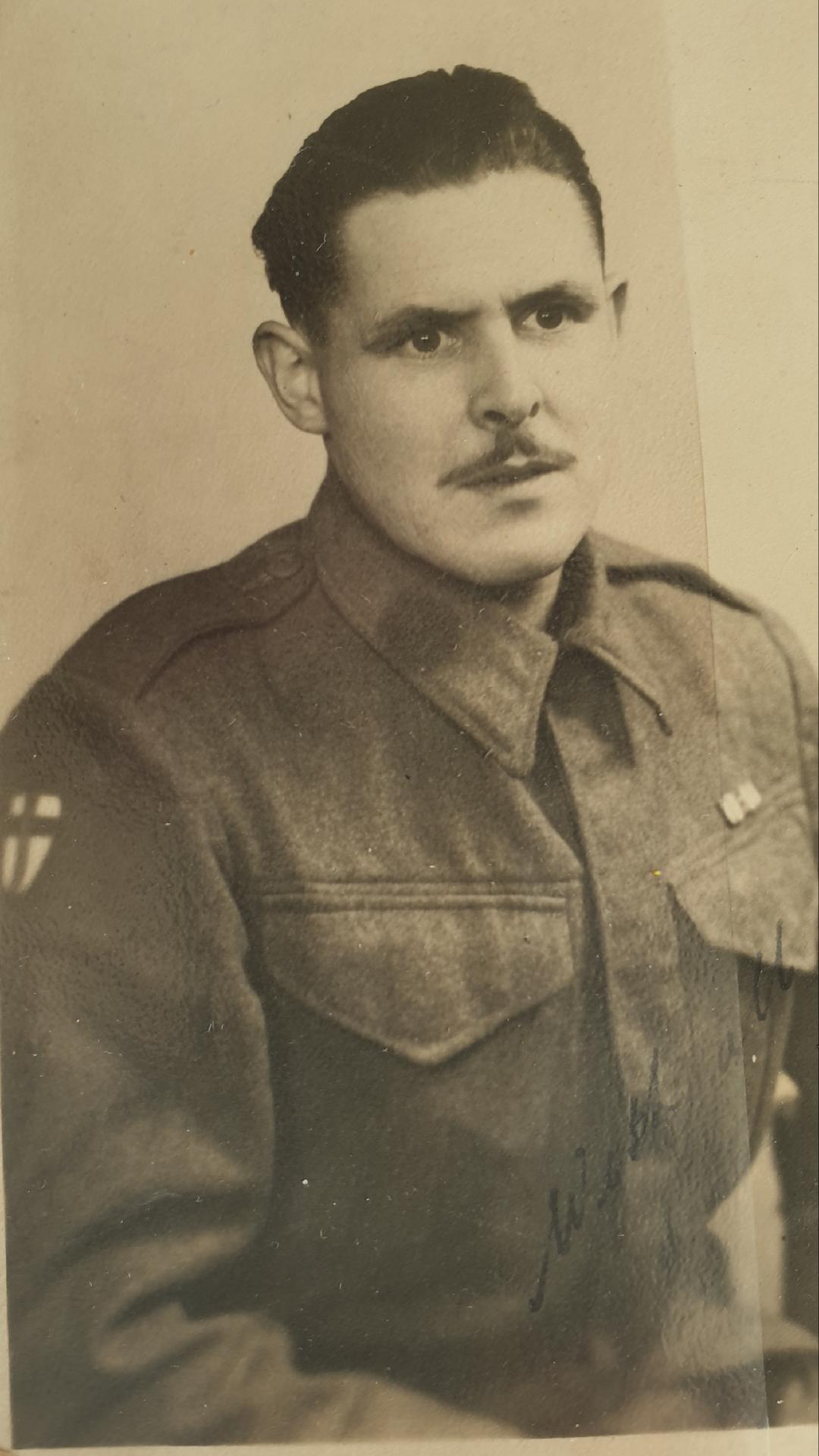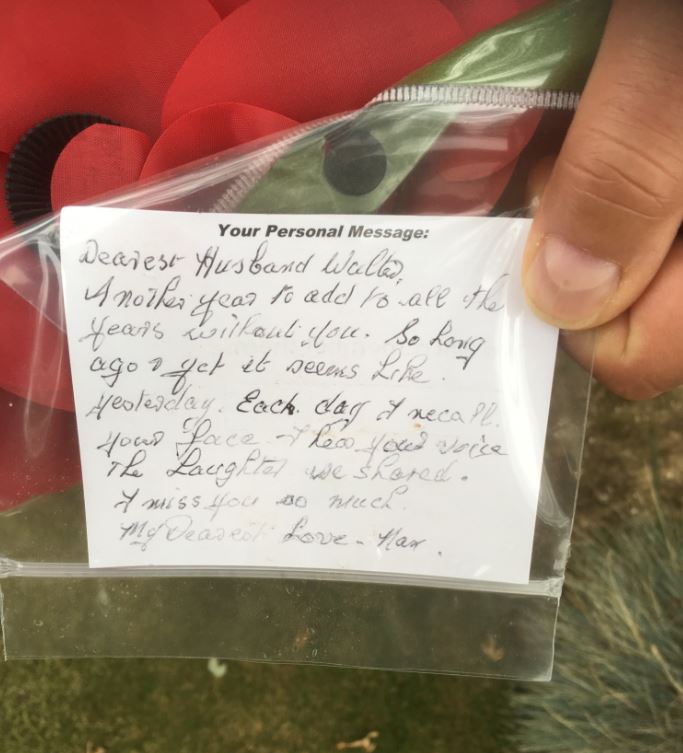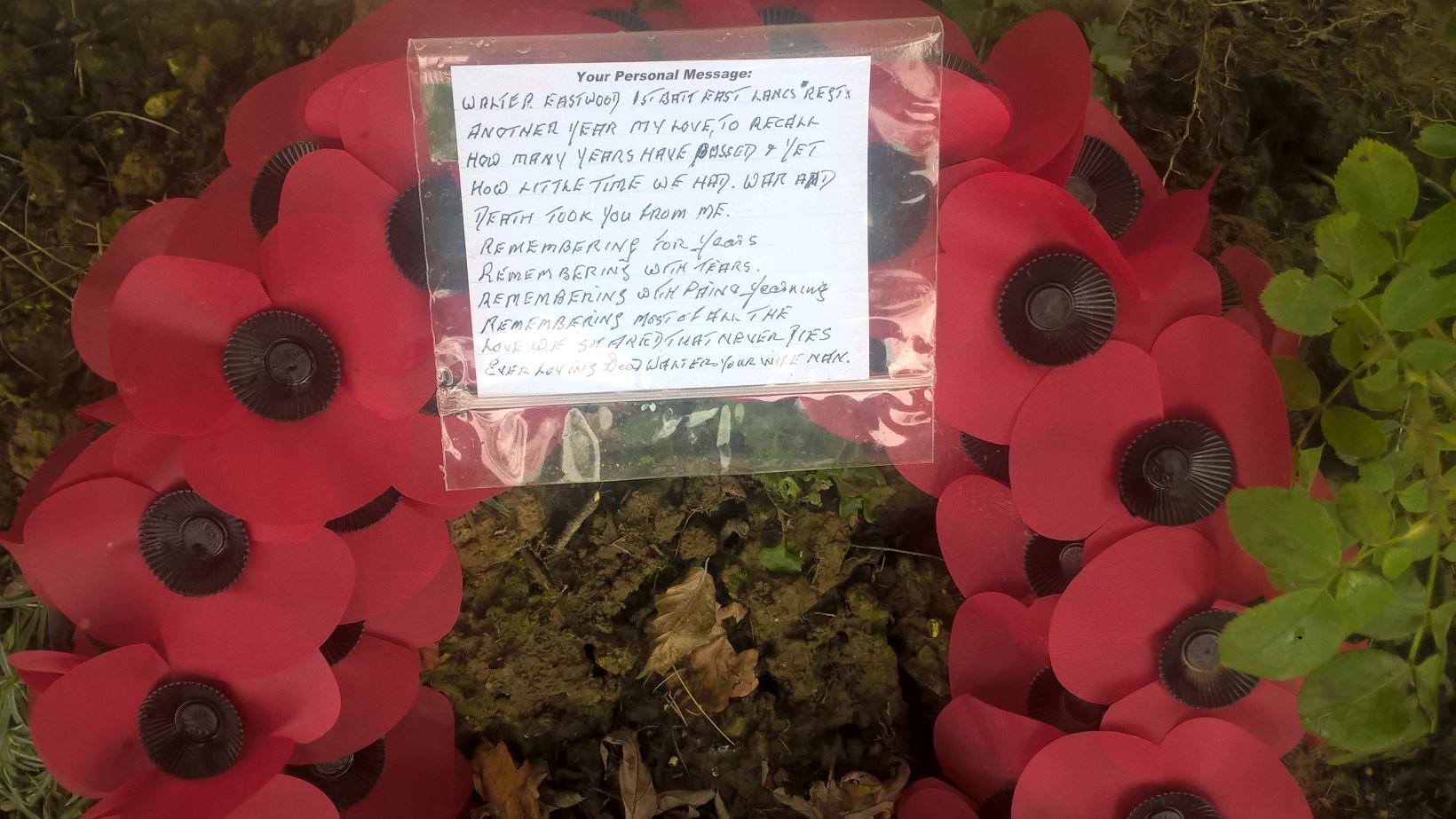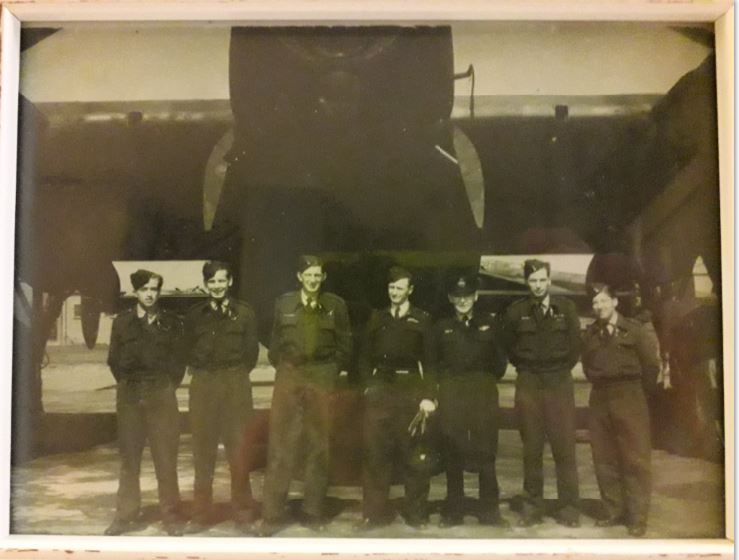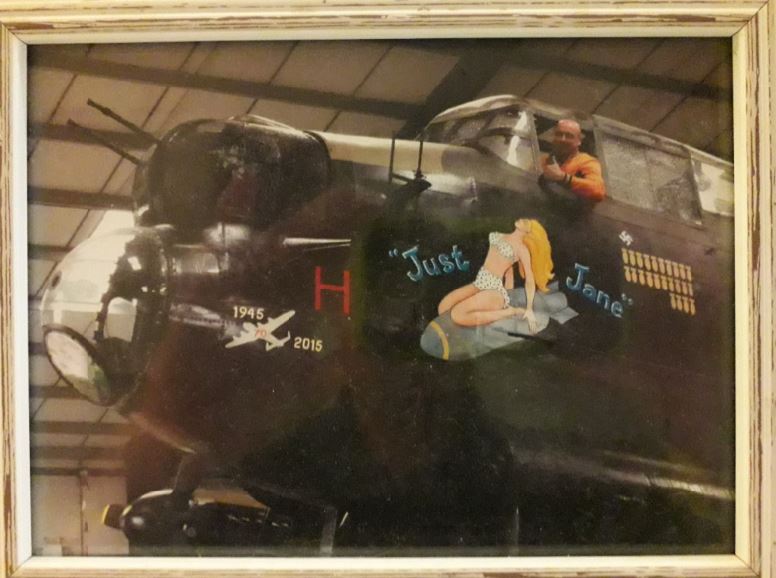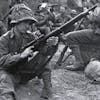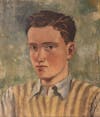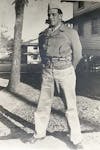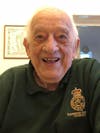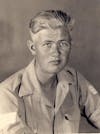49 Christmas at War 2019 Second World War
War Poetry 3 and seasonal heartwarming tales.
Ben, Yorkshire Prose, out for a walk with Barbara his gorgeous Dachsund
Yorkshire Prose out for a walk and some more Yorkshire tales
Barbara the Dachshund (below! ;)
This episode: Another helping of soldierly stories wrapped up in rhyme.
We’ve got a poignant verse written to a soldier by his tank comrades whilst he was laid up wounded in a military hospital.
A poem written by German soldier Heinrich to his girlfriend. He never came back from the front but his loving lines have been re-enacted for us by Kessie and Rolf.
And there’s a recce mission for us all to work together on! I’m going to be asking for listeners’ help in locating Nancy, the long lost wife of a soldier killed in action.
News from America where young Savannah has broken all history test records at her school
PS - A great load of heartwarming tales of Christmas at war around the globe.
Plus a bonus interview with Lancaster veteran Claude Reynolds who's just turned 98!
Feedback/reviews in Apple Podcasts - Thank you.
https://www.justgiving.com/notforgotten
Yorkshire Prose on D-Day:
https://www.facebook.com/watch/?v=675220749587328
Heinrich - German WW2 Poem
Written on Christmas 1943 by then 19 year old Heinrich. He went missing in the battle for Leningrad in early 1944.
"The Author of the poem was my granduncle Heinrich, the brother of my
Grandmother. As far as I know he was a low ranking infantry soldier. He
was part of the siege on Leningrad, or at least near Leningrad when he
wrote the poem and later went missing in action. He was 19 when he
likely died in combat. His body was never found."
Somewhere in Russia we light
the candles for the night.
And so will your heart find me,
because I can't be with you.
Silent and unspoken
stay all my words
drifting homewards with the stars
through the solitude to you.
Many thousand wishes wander
glowing through the divine night,
where one human for another,
cares, loves and thinks and guards.
A Green Howards ‘B’ Company wag penned the following poem as a put down to the competing regiment:
“A fusilier can hold his beer, but seldom holds his bird!”
Wilf remembers Tommy Tinkler's Tom Foolery
“Olga Pullofski the beautiful spy” – this was Tommy Tinkler’s version. Totally daft but understandable entertainment amongst troops who were regularly risking their lives for our freedoms. The poem is a skit based on the video above.
“She’s Olga Pullony, the dirty old spy;
She hawks the mutton in Cairo,
Till she came to grips, with the bold Henry Phipps
Who had just landed by Auto Giro”
“Henry Phipps was of course, one of the members of the platoon, he was an introverted kind of guy, who said very little, mostly puffing away at an old pipe, which he regarded as just about the most important part of his equipment, he listened to all this with an air of resignation and tolerance, totally refusing to be rattled at all; his response was to take an extra-large puff on his old pipe and blow it in the direction of Tinkler, without so much as the raising of an eyebrow.
Sandy - British WW2 Poem
Here’s the poem that Major Sandy Boyle wrote and it’s well known amongst the ranks of former Green Howards and today’s Yorkshire Regiment.
"If I should never see the moon again
Rising red gold across the harvest field,
Or feel the stinging of soft April rain
As the brown earth her hidden treasures yield.
If I should never hear the thrushes wake
Long before the sunrise in the glittering dawn,
Or watch the huge Atlantic rollers break
Against the rugged cliffs in baffling scorn.
If I have said goodbye to stream and wood,
To the wide ocean and the green-clad hills,
I know that He who made this world so good
Has … somewhere ... made a heaven - better still.
Sandy Boyle is buried in Bayeux War Cemetery.
Samuel Malcolm Boyle, aged 34, BAYEUX WAR CEMETERY Row X. A. Gravestone 1.
Major Sandy Boyle 7 Green Howards
Frederick (Ron) Leader was a tank driver with Desert rats in North Africa, with Monty’s 8th army. He got injured when tank got hit and he spent some time in a Cairo hospital. He received this poem from his tank crew whilst in hospital.
If you’re blessing the heat in a Libyan tank
Or paying-in bombs to the Deutsche bank
If you’re up to the neck in the thick of the fight
Or polishing buttons from morning till night
If you’re working a lathe or pushing a pen
If you’re out on your ticket with other good men
At your plough or your sword
If you’re bombed or you’re bored
The crew and the troop and, they tell me, the pack
Are wishing you well and they’re wanting you back
A happy Christmas and good luck in the New Year!
Please excuse this mouldy slip
Yours economically
Skip
1941
Graveside prose from Nancy to Walter Eastwood, Lancashire
Flight Sergeant George Bill Green, rear gunner, 2nd left
Nigel Graham sits proudly in Lancaster Just Jane, Lincs Aviation Centre
https://www.lincsaviation.co.uk/
Interested in Bill Cheall's book? Link here for more information.
Fighting Through from Dunkirk to Hamburg, hardback, paperback and Kindle etc.
Charity shout out
Way back in 1919 American soprano Marta Cunningham visited a British Ministry of Pensions hospital, having heard that there were ‘perhaps a handful’ of soldiers wounded in WWI still residing there. She called on the Matron and asked if she had a few lonely patients who would like to come out for tea. The Matron looked surprised and replied that there were in fact 600 injured patients lying in the hospital, with many more across the country. Marta was horrified by what he saw:
“Could these wasted, listless men be the once adored youngsters, who, but a few years, nay months ago, went so dashingly, with a swing and a song to the Nation’s rescue. Alas and this was their reward - suffering, silence and loneliness.”
Marta had been an avid charity worker during the Great War, WW1, and she soon set about contacting her friends to organise tea parties, concerts and outings for those able to attend.
During one of these early invitations one injured soldier said: “We don’t want charity Miss, we are forgotten by everybody and we’d better stop so.” But, undeterred, on 12th August 1920, Marta formed the “NOT FORGOTTEN” Association for the ‘comfort, cheer and entertainment’ of the war wounded and within a year some 10,000 men had been entertained.
Thanks to the generosity of other charities and the public, as well as the firm backing of the Royal Family, hospital visits and tea concerts were followed by outings, drives and gifts such as fruit, chocolate and cigarettes.
Today, the duties of Patron have been taken on by HRH The Princess Royal (Princess Anne)
The Not Forgotten Association is asking for help in Finding the Forgotten – any isolated or lonely members of our Armed Forces community who are ill, injured or disabled and could use our help – they support serving personnel and veterans of any age and their youngest beneficiary is 23 and the oldest is 107 ½!
If you know of someone who could benefit from coming to one of their parties or holidays? Put them in touch with the charity!
The reason I’ve just given you that story is because listener Steve Vinnie Blake from Hampshire UK contacted me.
“You mentioned that Lancaster pilot Sidney Stevens enjoyed meeting new people for a chat. I have attended events organised by the Not Forgotten charity and have seen first hand, at their Tea Party events, the enjoyment and camaraderie these amazing veterans receive.
They hold these events nationwide for around 100 veterans and their partners at a time. On one occasion we were taken on a boat trip down the Solent, fed and entertained. There is always a broad cross section of veterans who attend their events from WW2 right up to Afghanistan.
I chatted to a D Day veteran who detailed the confusion of piloting a landing craft on D-Day.
Then there was a group of WRAFs who were stationed in Hong Kong during the late 60's. They explained how HK was used as an American R&R centre (Rest and recuperation) at the height of the Vietnam war and how they spent time with the GI's before they returned to their tour.
A Falklands veteran who served in the Royal Navy shared some of his experiences around the Sea Dart missile system. One comment I remember vividly was from a Korean war veteran who thanked me for helping arrange a wonderful day otherwise spent 'staring at the same bloody four walls' - I could go on.
I've found in attending these events that being surrounded by other veterans who have experienced similar things, the people I have spoken to are happy to chat freely and open up - and it's almost a form of therapy for them - a nice boat trip, food and a glass of beer go a long way too!
So Listener, you might want to donate, or you might even be in a position to offer some of your time. Maybe you know someone who could benefit from their services?
There are links to Not Forgotten in the show notes.
Of course Not Forgotten is a UK charity, and many thanks indeed to Steve Blake for raising the issue. Maybe we can feature a non-UK charity some time?
TRANSITION
Claude intro
Fighting Through Podcast - Episode 49 – War Poetry Three
WW2
More great unpublished history! WWII
….
Hello again and a warm WW2 welcome to the biggest second world war podcast for unpublished history.
You just heard the show intro from well-loved Lancaster Bomber Veteran Claude Reynolds who’s 98 today – I popped over to see him and more of that later.
I’m Paul Cheall, son of Bill Cheall, whose WWII memoirs have been published by Pen and Sword – in FTFDTH. The aim of these podcasts is to give you the stories behind the story. You’ll hear first-hand memoirs and memories of veterans connected to Dad’s war in some way – and much more.
It’s time for some more war poetry. When I first started this podcast, I had absolutely no idea that I would ever do any poetry, let alone a third episode of it!
So here we go with another helping of Soldierly stories wrapped up in rhyme. And I have to say, there is some great material – and it’s not just poetry either.
We’ve got some fantastic feedback to share, including some super news from America where a young lady called Savannah has broken all history test records at her school - as a result of her listening to the fighting through podcast.
We’ve got a poignant verse written to a soldier by his tank comrades whilst he was laid up wounded in a military hospital.
I’ve got a poem written by German soldier Heinrich to his girlfriend. He never came back from the front but his loving lines have been re-enacted for us by Kessie and Rolf.
And there’s a recce mission for us all to work together on! I’m going to be asking for listeners’ help in locating Nancy, the long lost wife of a soldier killed in action fighting for the east Lancashire Regiment. And I’ve got a surprise regarding at least part of this mystery.
Finally, we’ve got the genius of popular poet Yorkshire Prose lined up to give us a rousing tribute to the brave Stan Hollis VC.
So, there you go, what more could you ask for?! Well, possibly a PS I guess! As it’s the Christmas season, I’ve got a few festive tales of war lined up for you, so keep a hankie spare!
Transition
I’m going to get the ball rolling with some feedback.
Feedback time
Thank you all for very nice feedback on various platforms from various countries
Craig AKA SPeGGeT LoVR, Gilbert Dunkley, Daniel Krebecek, Melanie Hines, Kevin Williams, Vic on Apple USA and Sailor Boy, Rob Pinnick and Joy Nors who said “ I love the veterans and God bless America and British men and their families - thanks to you all”.
And a few of you did say how much you enjoyed the German episodes for which I’m very grateful – because they were long weren’t they?!
And “What an awesome podcast” says Gwrtheyrn Grithian from GB! Grith-ian? Gotta be from Wales, from the valleys maybe? You know I’m going to stick with Nicht Sheesen – it’s so much easier to pronounce!
Informative, funny, sad, tragic, heartwarming, historical. Currently hooked on this podcast and hope you continue creating them. These podcasts are great company on my daily commute. The extracts from the book are great and then the intertwining of other’s stories and the words of actual veterans is amazing. Can’t get enough of it.
Grithian thank you so much – FB of the month
Gwrtheyrn via Apple Podcasts ·Great Britain ·11/28/2019
Finally
Shout out for young master Vinnie Blake, aged 10, from Hampshire, England. He’s a fan of the show and son of Steve Blake who sent me all the details about the Not Forgotten charity.
TRANSITION
Many thanks indeed to Dawane Harris who has recently sponsored the show through Patreon.
And similar Patreon thanks to Nigel Graham from Harworth, Doncaster. Nigel has also sent me a story and photos with a Lancaster Bomber connection so
My Grandad was Flight Sergeant George Bill Green, rear gunner... 'tail end charlie'
101 squadron Pathfinders on Lancasters.
He flew 28 missions over Germany from the beginning of 1945. He always use to say on the night his squadron bombed Chemitz, which was 2 days after the Dresden raid, he could still see it burning all the way in on the bomb run.
Grandad Bill was my hero, he died 19 years ago and I still miss his war time stories to this day and I wish I'd asked him more.
Thank you for your podcast and long may it continue.
Kind regards
Nigel Graham
I live in Harworth, a village near Doncaster. Thank you for your reply and I'd love it if you mention Bill my Grandad,
I've attached 2 pictures, one of Bill, he's 2nd from the left and one of myself in Just Jane.
My wife bought me the full day pass to spend the day at the airfield and get to taxi in the plane, I also managed to sit in the rear turret so got the full experience of take off just like Bill did 28 times.
Just Jane
Lincolnshire Aviation Heritage Centre
The largest Bomber Command museum in the country!
Relive A World War Two Bomber Airfield Here At East Kirkby.
Experience The Sights And Sounds, Smells and Atmosphere of a bomber airfield.
The only place in the country to see a Lancaster Bomber on an original wartime airfield, and ride in it!.
Including, original Control Tower, welcoming NAAFI and an emotionally evocative Memorial Chapel containing the 848 names of personnel who gave their lives from the East Kirby airfield.
Nigel thanks once again for your kind sponsorship and I can only say that at least you’re getting a feast of Lancaster stories in this show, especially from rear gunners, so I hope they’re giving you an extra insight into what your gf went through in the Second World War.
And when I spoke to Claude Reynolds recently, he shared with me a new story as tail end Charlie and But I’m saving that up for episode 50. Booo!
What? You’d like to hear it now? Yessss!
Oh go on then, twist my arm …
I called on Claude to wish him a happy birthday above all but of course I couldn’t resist taking my recorder with me.
>>>>>>
Bottom line, Claude seemed very well and had no complaints that weren’t in keeping with his age. But he seemed pretty alert and all things considered was in fine fettle.
TRANSITION
Let’s have some poetry ..
Major Malcolm Boyle GH
This poem was written by Major Malcolm Boyle (known as Sandy) of the 7th Battalion, The Green Howards - shortly after landing on Gold Beach on the 6th June 1944. He sent it to a friend in another regiment.
Major Boyle commanded D Company, having sailed over on Empire Rapier before embarking onto the landing craft. The battalion faced bitter fighting in the Normandy countryside in the days following the D-Day landings.
(Listener Eddie Toms – Of course your Dad Ned Toms was in C company 7th GH and he’d have sailed over on Empire Lance, same ship as my Dad. Of course they all landed on various segments of Gold Beach, so not at all far from Major Boyle)
On the 16th of June, the 7th battalion was advancing along the road south west of the hamlet of les Orailles, with D company leading the advance.
They came under attack from the deadly German 88mm guns, heavy machine gun and mortar fire. Amongst the dead were the two leading company commanders – Major Boyle being one of them.
Private Tateson wrote: “The sudden loss of these two officers had a depressing effect on us all. We were in a very sombre mood.”
So here’s the poem that Maj Boyle wrote and it’s well known amongst the ranks of former
Green Howards and today’s Yorkshire Regiment.
If I should never see the moon again
Rising red gold across the harvest field,
Or feel the stinging of soft April rain
As the brown earth her hidden treasures yield.
If I should never hear the thrushes wake
Long before the sunrise in the glittering dawn,
Or watch the huge Atlantic rollers break
Against the rugged cliffs in baffling scorn.
If I have said goodbye to stream and wood,
To the wide ocean and the green-clad hills,
I know that He who made this world so good
Has … somewhere ... made a heaven - better still.
I think he’s saying that if he should die fighting and no longer be able to enjoy the natural fruits our planet has to offer, then there’s an even better place waiting for him in heaven. Go on then, let’s hear it once more …
I’m now going to read a short passage from Synge that covers the action that Maj Boyle was involved in and there’s no doubt that the Green Howards had been having a very tough time …
>>>
Sandy Boyle is buried in Bayeux War Cemetery.
Samuel Malcolm Boyle, aged 34, BAYEUX WAR CEMETERY Row X. A. Gravestone 1.
INSCRIPTION
“WITH CHRIST; WHICH IS FAR BETTER"
Pic in Show notes second world war
Peter Leader [Reddit, tanks] a Brit living in Sweden!
My grandfather was a tank driver with Desert rats in North Africa, with the 7th Armoured Brigade, part of Monty’s 8th army. He got injured when his tank got hit and he spent some time in a Cairo hospital. He received a poem from his tank crew whilst in hospital.
His name was Frederick Leader but we called him Ron. He was from Wimbledon, England. I live in Sweden.
He always spoke of being a part of the desert rats and that he was in the County of London Yeomanry Sharpshooters.
I took the opportunity to check out the CLY and it seems to me that they more than carried their weight in the second world war.
According to Wikipedia, the CLY Took part in Operation Crusader end of 1941. The British armoured force suffered 530 tank losses so it was a tough fight. 6 months later they were in the Battle of Gazala in North Africa. The late Wilf Shaw fought in this tough battle and I suspect that’s where Ron could have got wounded if he ended up in a hospital in Cairo?
Later, in 1943 they took part in the Allied invasions of Sicily and Italy, followed by Normandy, landing on 7 June.
So I think we can all appreciate that by the point Ron was wounded, he and his comrades had really been in some tough fighting and I think that greatly influences the sentiments behind the poem
If you’re blessing the heat in a Libyan tank
Or paying-in bombs to the Deutsche bank
If you’re up to the neck in the thick of the fight
Or polishing buttons from morning till night
If you’re working a lathe or pushing a pen
If you’re out on your ticket with other good men
At your plough or your sword
If you’re bombed or you’re bored
The crew and the troop and, they tell me, the pack
Are wishing you well and they’re wanting you back
A happy Christmas and good luck in the New Year!
Please excuse this mouldy slip
Yours economically
Skip
1941
The poem went up on Redditt a while back and it didn’t take long to collect a few comments.
Litdabber_5 - That's soo sweet. Must have been hard in times like that. Being part of a tank crew wasn’t easy.
DarkMagic600 – That’s pretty cool, quite difficult thinking about how hard they worked, such a unique artifact
hellrider89 - Damn that's cool. It shows the bonds that people create with each other in combat.
Peter added, After he was better, Ron Leader went on to Italy and D-day +4. His unit Later took a bad beating at Villers-Bocage in France.
That’s pretty much where my own Dad was wounded!
Peter has sent me a photo of his Dad – show notes
In fact the pics and poems are all to be found in the Show notes if you want to read them again – all from the second world war.
HOW GOOD IS THAT?
Dawane Harris and daughter
Savannah is her name she’s 11 – very special story about how well Savannah did at school after listening to the FT Podcast.
First I’ll just tell you about her Dad, Dawane. He comes from Kuna, Idaho USA
“I tried to enlist twice. I had an accident in high school with a chainsaw which removed most of my left forefinger. Ouch! I was denied waiver twice when trying to enlist at various times
My Grandfather served in Germany and Italy with 28th Marine and then at Iwo Jima in Japan before later fighting in Korea with the 24th!
Dad was at the Ia Drang river valley in Vietnam
Paranormal and something of a success in powerlifting – spooky combination if I may say.
Wife and I will finally make it over to see everything next year. I'm terribly excited. Family tree starts in Scotland
Savannah story
Daughter came to work with me. Listening again. She loves your show but can’t understand why you talk different than us. Hahaha
Savannah comes home on Wednesday from school, slams a test on Dunkirk on the table and says "BOOM! 96% THANKS TO THAT ENGLISH GUY!" Then SHE goes on to say, "HOW GOOD IS THAT?!" HA HA HA! THANKS PAUL, for helping my daughter with her test!
Dawane thanks so much for all that and especial thanks to Savannah for enjoying the show and I’m totally blown away to hear that not only does a young American girl enjoy the show, but that she did so incredibly well in her test as a result of listening to FT WW2 Podcast.
I asked Dawane where she lost the 4% and apparently she gave the wrong date for the Dunkirk escape as 6 June which was of course D-Day, not Dunkirk. The Dunkirk evacuation actually ran over a period and I’m now going to ask you what those dates were because I’ll confess I had to Google it to double check. So think about it and put your cash or Hong Kong dollars down on the table. I’ll tell you the answer in the PS. I’m looking for an answer between the something of May and the something of June.
I had to laugh when I heard that Savannah thought I talked funny because it’s not the first time I’ve heard that. To be honest my accent is quite mild compared with the way people speak in the heartlands of the North East of England and Yorkshire, which is where the Green Howards were based.
I think most Brits have become accustomed to a wide range of American accents through many years of TV and movies – but it’s not quite the same degree the other way round though it’s getting there.
I’m going to share with you a little voice message that Dawane and Savannah left for me on Speakpipe via my contact page …
>>>>
Savannah moving on now but I’ll just warn you I’ve got a right royal prince of Yorkshire poetry coming up soon in Ben, and you’re going to love his immaculate, well-honed, Yorkshire accent when he tells us about Victoria Cross medal-winning Stan Hollis and Gold Beach on D-Day – soon.
But still talking about accents, this is a true story …
Medical centre - I’m Merrily – I’m early
On the subject of accents I’ve got to share this short true story with you. I was in a waiting room just yesterday when a physio came in to greet a customer. I’m Merrily, she declared and the handful of waiting people all gave a communal smile of approval at the coincidence of such a happy-sounding name at what was a festive time of year. “Ding dong Merrily on high” was clearly etched in their collection of thought bubbles. Until the customer said, “Hi Merrily” to which she replied “No, I’m not called Merrily – I just said I’m early – I’m Irish”. I’ll let you think about that one.
I’m Merrily, I’m early, I’m Merrily, I’m early, I think Merrily would make a lovely name.
In fact I decided to Google it and guess what …
The meaning of the name “Merrily” is: “One who is joyous”. A variation of Meredith or Merry. Also means "A great chieftain" in Welsh. There you go Grithian from the valleys of Wales – I’ll bet a quid that Merrily’s your middle name!
Thanks to thenamemeaning.com for the back up on that.
TRANSITION
Getting down to some more brass tacks now – Savannah that means getting down to the nitty gritty of the show. Nitty gritty means … Oh Google it!
Heinrich the German Soldier
The siege of Leningrad was a military blockade undertaken by Nazi Germany against the Soviet city of Leningrad (now Saint Petersburg) on the Eastern Front in World War II.
The siege started on 8 September 1941, when the Germans severed the last road to the city. Although Soviet forces managed to open a narrow land corridor to the city in January 1943, they did not lift the siege for another year, 872 days after it began. The blockade became one of the longest and most destructive sieges in history, and possibly the costliest in casualties suffered.
Total: 579,985 casualties German = over half a million
Total: 3,436,066 casualties Russian = nearly 3.5 m
The Other Side Archive wrote quite a while back and he gave us some great war Stories from the GERMAN SIDE OF THINGS which I put in episode 46, Through German Eyes
He also sent me a poem written Christmas 1943 by a young German soldier Heinrich, to his girlfriend. He went missing in the battle for Leningrad in early 1944, so that would have been around the time the siege was being lifted.
I’ve been saving the poem till now. I’ve been lucky enough to obtain the support of two German speakers to help me with it.
There’s Jorgen, reading as if he were the soldier.
And Kessi Riliniki, she’s playing the part of the girlfriend, reading the poem her loved one has sent …
The other side said to me:
“The Author of the poem was my granduncle Heinrich, the brother of my
Grandmother. As far as I know he was a low ranking infantry soldier. He
was part of the siege of Leningrad, or at least near Leningrad when he
wrote the poem and later went missing in action. He was 19 when he
likely died in combat. His body was never found.
This is so sad. This is Jorgen.
TRANSITION Second World War
German
Irgendwo in Russland zünden
wir zur Nacht die Kerzen an.
Und so wird Euer Herz mich finden,
da ich nicht bei Euch sein kann.
Stumm und ungesprochen bleiben
alle Worte, die von mir
mit Sternen heimwärts treiben
in die Einsamkeit zu Euch.
Viele tausend Wünsche wandern
leuchtend durch die fromme Nacht,
wo ein Mensch um einen andern
sorgend liebt und denkt und wacht.
Somewhere in Russia we light
the candles for the night.
And so will your heart find me,
because I can't be with you.
Silent and unspoken
stay all my words
drifting homewards with the stars
through the solitude to you.
Many thousand wishes wander
glowing through the divine night,
where one human for another,
cares, loves and thinks and guards.
Somewhere in russia we lighten
Candles in the night.
And through them, your heart will find me
For I cannot be with you.
Silent and unspoken they stay
All the words I sent
drifting homewards with the stars
Into your solitude.
Many thousand wishes wander
Glowing through the calm night
Where one human for another
Cares and thinks and watches over.
TRANSITION
Wilf – Olga Pullofski
Tommy Tinkler, WW2 soldier story
Lighting the mood a little, I'm now going to read you an extract from the late Veteran Wilf Shaw’s unpublished second world war memoirs.
Around about 1943, Wilf and his comrades were sweating it out in the North African desert.
I'll let Wilf tell you the rest.
Rain in the desert was unheard of, conditions were for the most part hot, dry and arid through the day, and freezing cold at night; I remember that it did rain though on one occasion, it was in the early hours of the morning, and it wasn’t long before the deluge had completely flooded our dug –outs, equipment was soaked, weapon pits were full of water, it must have rained two or three inches of rain in a matter of two hours or so, we stood around wet and miserable with ground sheets around our shoulders, I can clearly remember retrieving my rifle, dripping with muddy water and having to clean and oil it under the cover of my ground sheet; if the enemy had decided to attack then we should not have stood an earthly chance of defending ourselves, the fact that he didn’t was that he was probably undergoing a similar state of affairs himself.
In a day or so we were back to the same old routine, discipline had to be maintained; 0600 Hrs reveille, 0700 Hrs Breakfast, 0800 Hrs On parade, drill, and then duties, mostly digging and improving defence positions, this took up most of the day, in the hot climate it was hard and tedious work, we worked in groups of five or six, the conversation was the usual repetitious stuff, about civvy street, when the war was going to end, how the Russians were going, moans about the grub, moans about the “bullshit” as it was commonly known amongst the lads, kit inspections, overzealous NCO’s, must be a week since we had any mail, listening to the optimists – “It’ll all be over by Christmas”, etc.
There was the inevitable humour, without it you might just as well have curled up and died. I remember one particular member of 13 platoon, Tommy Tinkler. At various times, mostly when we were travelling by convoy or whilst engaged with other groups on some working party or other, he would suddenly burst out into a song. Not that he had any pretensions about his singing – he used singing and well known songs as a means of expressing his thoughts about things which hadn’t a lot to do with war.
And this always turned out to be his own particular version of a popular pre-war song with the words altered. It would include references to one or other members of the platoon and the words were always idiotic, but always good for a laugh, like the words to a tune which was played by one of the pre-war popular dance bands; Band leader Henry Hall played this one a lot, it was “Olga Pullofski the beautiful spy” – this was Tommy Tinkler’s version.
I wish I could play the music on the podcast but copyright rules prevent it. But if you nip over to the show notes you’ll find a short you tube vid which shows Henry Hall singing the tune.
This is Tommy’s version:
“She’s Olga Pullony, the dirty old spy;
She hawks the mutton in Cairo,
Till she came to grips, with the bold Henry Phipps
Who had just landed by Auto Giro”
Henry Phipps was of course, one of the members of the platoon, he was an introverted kind of guy, who said very little, mostly puffing away at an old pipe, which he regarded as just about the most important part of his equipment, he listened to all this with an air of resignation and tolerance, totally refusing to be rattled at all; his response was to take an extra-large puff on his old pipe and blow it in the direction of Tinkler, without so much as the raising of an eyebrow.
There was nobody special in the Coy - we all had the P taken out of us, just as we took it out of somebody else.
Tinkler was a Tynesider (from the River Tyne in the North East of England) as were a good number of the battalion, which formed a part of the “50th Northumbrian Division”. There was a good representation of the British isles however, Scottish, Irish, Welsh, Yorkshiremen, Lancastrians (like myself), Londoners, West countrymen, Midlanders, etc; this resulted inevitably in a good deal of banter and friendly rivalry – Which part of Britain had the most beautiful girls, the most beautiful scenery, which was the most industrious, who had the best football teams, etc.
…
Listener, if you want to hear more of this story then you'll have to wait until I can publish wilf’s full memoirs in audiobook. It's going to happen sometime in 2020 and hopefully sooner than later. I’m gradually dipping in and out of it to hone the script and I can tell you there is a stack of unheard material in it so if you are a real Wilf Shaw fan you are going to be in for a right treat. So keep your ears peeled Sergeant and I'll keep you informed of any developments. What I can tell you is that it’ll be released on Audible and any profits will be going to charity.
TRANSITION
Interlude
You’re listening to the Fighting Through Podcast, Episode 49 War Poetry – Great Unpublished War History –
WW2 and WWII
TRANSITION
Yorkshire Prose
Ey up - I now want to introduce you to Yorkshire lad Ben Taylor better known as Yorkshire Prose. He’s built himself a big fan base for his poetry, spoken in his mother tongue of .. Yorkshire, England.
In his own words, he’s just a simple Yorkshireman who likes talking to him sen...
He walks around the countryside with his gorgeous little dachsund Barbara. She's the spitting image of the family dog we had when I was a kid, Trudy she was called.
Ben's a military man, a sailor. But his significant sideline, apart from playing Rugby, is poetry and he pens up as Yorkshire Prose with rhymes about all sorts of things Yorkshire, but with a particular bent for military matters, such as paying tribute to the fallen on Remembrance day, or making our mouths water with lists of traditional Yorkshire grub served up on Bonfire Night, Bommy Night, or Guy Fawkes as others know it.
For me, one of his best works is about Stan Hollis, who famously won the VC on D-Day as he landed with the Green Howards on Gold Beach alongside County comrades from the East Yorks battalion. Ben, over to you and thanks so much for letting me use this in the show.
>>>
You can hear more from Ben all over Social Media, just google Yorkshire Prose. There are links in the show notes. And hey, Ben, if you’re listening, I reckon it’d be great if you could come up with an ode to Bully Beef, that staple of so many British army stomachs, because it keeps cropping up so often in this podcast! Thanks so much for letting me share your poem Ben.
Transition
This next poem (well, sort of) relates to a section in Tom Wharton’s book, Operation Banner, about the Green Howards in Ulster, Northern Ireland, 1970-2004. I told you about Tom’s book in Epsiode 45 and there’s another link in the show notes to it.
Apparently the Royal Regiment of Fusiliers were stationed in NI as well and some of the Fusiliers shared accommodation with the Green Howards.
The word is out that the Yorkshire men have appealed to the local beauties at the expense of the Fusiliers! In other words, the local girls fancy the Green Howards more than the Fusiliers. This has caused hackles to rise!
A Green Howards ‘B’ Company wag penned the following poem as a put down to the competing regiment:
“A fusilier can hold his beer, but seldom holds his bird!”
Transition
War Stuff
Barrie Barnes has a new book out. Chaos in the Sand: A History of XIII Corps at Alamein.
After the protracted and bloody battles in the Gazala Line, May/June 1942, the defeated Eighth Army was in full retreat towards the positions at Alamein. Here the Eighth Army licked its wounds and replenished its stocks of men and materials. Montgomery was appointed as the new commander and instilled into his troops a new air of confidence. Most studies of Alamein focus on the northern coastal sector where the main action was fought. This study looks at the southern sector held by XIII Corps:
50th Northumbrian Division, 1st Greek Brigade under its command.
44th Home Counties Division and the 7th Armoured Division with 2nd Free French Brigade under its command.
Though the fighting here was not on the same scale as the coastal sector it was none the less a series of bloody actions and hundreds of men perished. XIII Corps had the job of holding, on their front, German and Italian armoured divisions that would otherwise be sent north to impede the main attack by Eighth Army.
After the first attacks in the north and south failed to break through the Axis forces, Montgomery organised Operation Supercharge, a thrust in the north headed by infantry and artillery. Get Chaos in the Sand if you want to know what happens next .
There's a link in the show notes, second world war
Barrie Barnes has been mentioned on the show before and he’s a keen 50th Division fan. He once interviewed Dad about the battle of Wadi Akarit in Tunisia. His book on that, Op Scipio, has proven to be popular – Barrie gave Dad a signed copy of the book and it’s firmly on my most treasured shelf at home.
TRANSITION
War stuff
Shout out for we have ways episode
From D-Day to Bastogne
American James ‘Pee-wee’ Martin parachuted into Normandy on D-Day; fought on Hell’s Highway during Market Garden; and at Bastogne during the Battle of the Bulge.
He recently spent time with James Holland retelling his extraordinary story. Not to be missed – on the We have ways of making you talk podcast.
And oh my goodness. I’d seriously recommend you check out this interview because it’s excellent. Pee Wee is a star – he cuts swathes through common beliefs about the way the war was fought and turns them into misconceptions in such an engaging fashion. If you want a great leveller by a very modest man check out the 5 December episode of Ve Haf Vays - D-Day to Bastogne, with American veteran James Pee Wee Martin.
TRANSITION
Overcast
Just a quick message for any listener who uses Overcast as their app of choice.
I’ve noticed a couple of times that I’ve been listening to myself and thinking, woah Neddy, slow down, and finding it just a bit hard to keep up with the narrative. So I have thought next time I’d pump a bit more space into it. But then, when I’ve checked the Overcast app I’ve noticed that the listening setting has defaulted to Smart speed, which shortens silences between sentences and even words. So if you do think I’m rushing off the words rather too hurriedly, it might be worth checking the app to see that you haven’t pressed the smart speed button by mistake.
And whilst I’m talking about Overcast if you want to support the show whilst using it, please click the star icon against some of your favourite episodes because doing this helps my position in the rankings, which in turn will help other people find one of your favourite podcasts!
TRANSITION
Walter and Nancy Eastwood.
Keith Farquharson
Keith Farquharson is trying to trace a WW2 veteran’s combat history and to locate his believed surviving wife Nancy
Paul,
My friends and I have been visiting the WW1 Somme battlefields for a number of years.
Some years ago we came across a group of WW2 graves in the mainly WW1 London Cemetery and Extension at Longueval, France.
Some of the graves were from the East Lancashire Regiment, and armoured units. One of them was Pte Walter Eastwood, 1st Battalion, East Lancashire Regiment, KIA 5th September 1944.
We noticed Walter’s grave as there was a wreath on it, and a message from his wife (Nancy). It was extremely evocative and emotional (Not a dry eye amongst us).
Since then we have visited Walter’s grave every year, and each year has had a new wreath and message (equally moving). After a lapse of a couple of years, there was a new wreath this year again from Nancy – so Listener this is 2019 we’re talking about.
Now Keith has written to see if the Fighting Through Podcast can help dig a bit deeper into this story and in particular to locate Nancy Eastwood whom they believe is alive today.
Keith has told me quite a bit about Walter:
He was born 3rd July 1918 at Haslingden, Lancashire, to Walter and Margaret Eastwood.
He was the youngest of four children and his mother died a week after giving birth to him.
Walter’s father remarried to Anne and they had three children together – so that gives young Walter three ‘direct siblings’ and three ‘step-siblings’. They lived in Hargreaves St, Haslingden, near Manchester and there’s a suggestion that Ann’s children, at least, may still be alive now.
Walter and Nancy were married in 1943 but did not have any children. Nancy was born in 1923 so that makes her 96 this year, 2019.
The CWGC records show that Walter and one of his comrades were originally buried at Bouquemaison, in the Somme, France – before being re-interred. So it seems likely that the action in which they died was close by. Has anyone come across any records of actions involving Walter’s unit, or fighting in that area 5 Sept 1944?
We’re also trying to trace Nancy Eastwood so she is aware that others visit her husband which in itself may bring her some comfort.
Listener, if you have any knowledge of any of this, please do get in touch.
So that’s
Pte Walter Eastwood, 1st Battalion, East Lancashire Regiment, KIA 5th September 1944.
Nancy Eastwood believed to be alive in 2019 aged 96.
So if you recognise these names from the Lancashire area, do get in touch and I’ll connect you to Keith Farquharson, who’s trying to join the dots in Walter’s combat history and offer a bit of comfort to an old lady, Nancy.
And if someone does get in touch, well, how good would that be?! And hey keep listening cos I’m going to knock your army socks off in a second …
Keith thanks for contacting the FT podcast. I’ll keep you posted.
As a final strange coincidence, my Grandad fought on the Somme in the first world war with the first East Lancs. In fact he was gassed at some point and I remember when I was a little lad, Grandad was always coughing and wheezing as a result of his exposure to the gas, which I think was mustard gas. And of course Dad was also in the first East Lancs at the end of the war in Germany even though he started off in the Green Howards.
Because of my family connections with the first East Lancs, I've got rather a special book on my shelf. And it's got some quite interesting stories in it. The book is called the East Lancashire Regiment 1939 to 1945! And it's got entries in it pertaining to the day Walter died, 5th of September 1944!
Oh go on then I'll read it out. Here goes - just a bit.
The copyright of the book belongs to the Lancashire Infantry Museum and Thomas Mallinson, the Assistant Curator has kindly given me permission to use it. If anyone would like to learn more about the Lancashire Infantry Museum,
There's a link in the show notes, second world war
This is from …
The East Lancashire Regiment 1939-1945
>>>>>
So, I’ll leave it to your imagination exactly how Walter died, but clearly he was involved in a lot of meaningful action. In particular, he played a part in the liberation of a village and gave the residents some welcome respite from the harsh effects of war.
Bravo to you east Lancashire Regiment
Well done, Walter.
Sad music
So if anybody knows of Nancy Eastwood living in the Manchester area, possibly Haslingden, do get in touch. My goodness, how good would that be if we managed to track Nancy down?!
I’m now going to share with you the tributes written on a couple of cards from Nancy to her dear departed husband, taken cruelly from her at the young age of 21.
Dearest husband Walter - Another year to add to all the years without you. So long ago and yet it seems like yesterday. Each day I recall your face, I hear your voice, the laughter we shared, I miss you so much my dearest. Love Nan
This is the other one that Keith spotted on another occasion.
Walter Eastwood 1st Battalion East Lancashire Regiment.
Another year my love to recall how many years have passed and yet how little time we had. War and death took you from me
Remembering for years.
Remembering with tears.
Remembering with pain and learning.
Remembering most of all the love we shared that never dies.
Ever loving
Dear Walter.
Your wife Nan.
Next episode
Next episode is going to be very special. It’s my 50th episode and I can hardly believe I’ve got this far.
I’m going to mix in a load of your favourite stories, with some of my own favorites, bloopers. Best clips and more. And there will be quite a few new stories and family histories to make up what I hope will be a bumper session that will tide you over till next year.
I’ve got an unheard story from Claude Reynolds and no doubt I’ll tease you with another extract from Wilf Shaw’s unpublished memoirs. Oh boy!
So make sure you’re subscribed to the show and that way it should automatically download for you just in time for that long journey or present wrapping session and if you haven’t wrapped your presents yet, get a move on.
Thanks to everyone who sent in comments and other contributions and thank you for your support and for making the time to listen to me.
Many thanks to Kessi and Jorgen for reading German soldier Heinrich’s poem for the show in such poignant fashion.
Kessi has her own high fantasy podcast called Counterbalance which you might like to check out. It’s sort of His Dark Materials meets Red Dwarf. Show notes second world war
And please - write, like, rate, review or share the show - howsoever it pleases you. Above all – enjoy. Please do hear me next time. And in particular, this time, if you can subscribe to the show in your app of choice it will help with my rankings and help more people to discover your favourite podcast. Thank you.
There’s a PS coming up with a number of … heart lifting Christmas stories at war.
You’ve been listening to the Fighting Through Podcast, Episode xx Ray Fitchett – Great Unpublished History –
Z`
Thank you so much for listening to every episode throughout the year. Please do hear me in 2020 – gosh! Tick tock goes the clock.
Merry Christmas, Happy New Year and Warm wishes howsoever you may be celebrating. If you want a bit of instant poignant festive cheer listening to how my Dad and the East Lancashire Batallion cheered up a bunch of German schoolchildren, take a shufty at Episode 24, Christmas at War!
I'll be back in the brand New Year, to give you lots and lots more cheer!!
I’m now going to end the show with some stories of Christmas at war. Get your tissues ready if you have any left.
Before that, the answer to the question I posed earlier, what were the dates of the Dunkirk evacuation? And of course you need the year and the dates from and to when the evacuation ran.
Here’s a clue and I’m going to read a very short passage from Dad’s book, Fighting Through from Dunkirk to Hamburg WW2 … he and his comrades have had a hard time of it in France, many of them have been wounded, killed or captured.
“As the ship was filling up, a Padre came and stood on a ladder, called for silence and prayed for our deliverance to England. At last, packed like sardines, the ship started to tremble and, so very slowly, we pulled away from the Mole – it was 1800 hrs, 31 May 1940.”
Dunkirk 27 May - 4 June – so Dad was middle-ish in the pecking order.
So if you got the dates right give yourself a pat on the back. You’re promoted instantly to sergeant. And if you got the year, then you’re a Captain.
Pause …
Are you still there?
Did you think I’d gone?
I thought you’d gone!
PS
Music? Silent Night
These are all stories from the excellent BBC Peoples War web site, all the way back to 2005!
Christmas Blitz 1940 - Joyce Whiteside - Salford, Greater Manchester
My lasting Memory of World War II is…the Christmas Blitz of 1940. The windows of our house were blown in and everything was covered in dust including the chicken which was for Christmas dinner and I remember we had sausage instead at my aunt’s home because of course we had to move out. [I bet you’d have loved some of my Mum’s home made carrot and cheese flan – but that’s a different podcast episode – 33, Wartime Recipes - And if you want to learn more about the Bombing Blitz of Britain listen to episode 13 UXB – it is a cracker – literally!]
Christmas Day in the desert – A British soldier - Anon
When we were in the desert the heat was overpowering and yet it was Christmas and we were missing our families, it didn’t seem like Christmas, the weather didn’t fit at all, we were used to cold, snowy weather, not this dreadful heat that sapped all our strength.
We were waiting for the ‘go’ which hadn’t yet come, we were waiting to see whether today or tomorrow would be the day we would recommence the fighting, and in the desert that was even more difficult than the normal fighting.
Here we were on Christmas Day, waiting, just waiting, and then, like in the First World War we heard singing and the German’s were singing carols and we joined in, and for that one day hostilities ceased. We talked with one another and shared whatever rations we had from home, home being Britain and Germany, and probably other countries as well, because by now we had other countries fighting with us, and against us.
It’s something I will always remember from my time in the war, even more so than the time when I was taken as a prisoner and lived on potatoes and not much else. That one act of compassion and brotherly love stays with you much longer than any act of aggression.
Christmas With The Enemy - Constance Smith - Wylam, Northumberland, UK
One Christmas Sunday they invited German POWs [based in Britain] to our chapel. They were Lutherens and had been going into our Methodist services and had been made welcome by most, if not all, of chapel's members, so we invited them to the carol concert.
They sang "Silent Night" in the original Geman and some people with a smattering of German joined in.
For one hour the war was forgotten and we all celebrated Christmas together. We managed to give them a cup of tea and a biscuit too.
It wasn't popular in the village, what we had done, but they were somebody's sons, somebody's brothers, somebody's husbands. Our soldiers were just obeying orders just like they were just obeying orders.
Often their English was very good and you could talk to them. It was interesting to hear their views about the Nazi regime and many of them agreed that it was evil and should be crushed.
The Christmas Pudding - Bojigs, Indonesia
It was Christmas Eve of 1941. War had been raging for some weeks now in the Philippines, and the Japanese had landed in several places in Luzon island.
But my grandfather Felix Mendioro had reason to feel happy. He had just evacuated his wife Sofia and their four children out of the small seaside town of Unisan. They lived in a hut at the edge of the jungle in the interior of the isthmus. There, they would wait out the expected fighting until it was safe to go back down.
But first there was the Christmas pudding to do.
In normal Christmases his family could count on a slab of ham, maybe half a ball of cheese, and loaves of sliced white bread to grace the Christmas midnight table. Tonight it will be a little austere, but at least there will be the pudding to help them mark the Child's birth.
My grandfather certainly knew his pudding. As a child he helped his mother make it every day, laying it flat over banana leaf-lined woven bamboo trays, which he then peddled in slices across town.
Later, as a Filipino forestry service officer in the colonial government, it was one of the things he will do occasionally in the field as a treat to himself and fellow workers.
Today he carried with him from town two kilos of glutinous rice and a kilo of raw caked sugar.
For the milk there were plenty of coconuts around. He climbed a tree and brought down a bunch. After cracking four nuts and letting the kids drink the water inside, he grated the meat. From the resulting pulp he squeezed with his hands the rich oily milk.
While doing this he would occasionally hear faint booming sounds somewhere beyond the isthmus' central hill range.
He knew it was the sound of war, but not that it was caused fifteen kilometers away, on the other coast of the isthmus, by a Japanese destroyer bombarding Filipino positions. Soon Japanese troops would be landing and out-flanking the ill-equipped defenders. By afternoon the Filipinos would be retreating inland, walking along the railway line that cut through the isthmus.
Grandfather started cooking the pudding late in the evening. He liked it hot off the stove when it was time to eat.
The expressed coconut milk he put into a pot along with the washed rice. Soon the pot was bubbling over a fire of dried coconut fronds.
He had just time to line the bamboo trays with banana leaf when he judged the rice half-done. The pot was taken off the fire and it was replaced with a pan on which Grandfather began melting the sugar cake.
He then emptied the pot of rice steeped in coconut milk into the sugar, put in some fragrant pandan leaves and stirred the lot over the fire until the mixture gelled and at the same time the rice was truly done.
After patting the pudding into the trays to let it breathe and develop its chewy consistency, Grandfather sat down and watched the stars. he judged from those revealed by the scudding clouds that it was time to wake the family up for the Christmas midnight repast.
But something moved at the edge of the firelight circle. Grandfather strained his eyes and could soon discern four figures crouching in the foliage. [Phillipino] soldiers, some with the flat helmets of the USAFFE [United States Army Forces in the Far East]
Two still had their rifles with them.
The soldiers got up slowly and just as slowly shuffled close to the fire.
The men were young, certainly much younger than Grandfather's forty years, but they looked aged, their clothes and faces grimy and their hair matted with dirt. They were breathing through their mouths. Grandfather later recounted that he was too petrified at this sight that he was at a loss for words.
Grandfather and the soldiers looked at each other silently, the latter too exhausted to also say anything.
Then they smelled the warm pudding. Still without a word they reached for the trays and began soundlessly eating it.
Soon the last of the pudding was gone. They looked at my Grandfather without a word but in their eyes a message of embarrassed gratitude.
Before they melted back into the night, perhaps to resume the journey back to their homes, they even took the banana leaves the pudding had lain on.
Christmas 1944. Thomas E. Jones - Prisoners of War - Austria. P.O.W. Work Camp
I and another comrade from the same unit had been in this place since October 1943. It was a farm Lager [a work unit based on a Farm] and there were twenty of us working in a tiny village. Having had a thin time the previous Christmas four of us decided to set about a somewhat different celebration. There were items in the Red Cross Parcels that some of the younger generations had never even seen before and that had great purchasing power.
We were able to borrow a table cloth and glasses and having set the table we had Schnapps home made wine and a few small cakes plus a ready cooked Pullet. Everything on that table was ILLEGAL. Now we had hardly ever seen a German Officer up to then, but that Christmas night of them turned up and we could see the lot being confiscated. This Officer looked at our table in the corner and walked slowly around the lager, saying nothing, until he came to our table and said, in perfect English, 'I see that someone is having a merry Christmas.
Always believing that attack was the best method of defence I asked if he would like a schnapps to keep out the cold. It was deep snow outside. He accepted and wished all the Lager the seasons greetings tossed back his tot and walked out, leaving the four of us to enjoy a Christmas dinner that could have been confiscated and a Christmas which could have easily been spent in the cooler. The other sixteen members of the Lager had elected not to join in the Dinner but we had enough booze to get everyone in a very good mood. So 1944 passed into history.
A WARTIME CHRISTMAS MEMORY Nancy Blaikie, who at the time was a youngster - Northern Ireland
There is only one wartime Christmas memory which has remained etched clearly in my mind. As a child it was the familiarity of Christmas which was important. It was always in our house, the same people were always there, dinner was always over before the King’s speech and no presents were exchanged until then. What we looked forward to most was waking up on Christmas morning to our stockings hanging from the mantelpiece bulging with promise.
Christmas 1942, my Father had convinced me that it was pointless to hang up a stocking. It had been a bad year. His business had received a direct hit [from a bomb during an air raid] on Easter Monday and I think business had been pretty grim. For the first time in my life I did not hang up a stocking on Christmas Eve. I woke up on Christmas morning, the usual anticipation was missing, I turned over and in the dim early morning light I could see something hanging from the mantelpiece: it was one of my school socks dangling lumpily and held in place by several books. In that instant my Father had restored to me the magic of Christmas.
I'm Paul Cheall saying
Bye bye now and a very merry Christmas whoever and wherever you are. I’ve got to go now, I’ve got presents to wrap! There’s one more person who wants to say something …
I’m Claude Reynolds
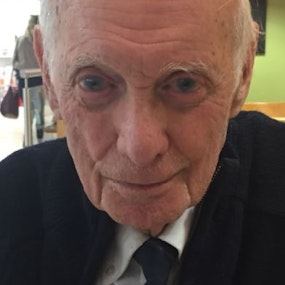
Wilf Shaw
"Still Trespassing" in Wilf's own words.
The late Wilf Shaw was in 6th Green Howards Battalion, British Army. He had a very full war and fought as a signaller with the Green Howards, 50th infantry division. He fought in many campaigns including fighting for Monty’s 8th army in Alamein, Wadi Akarit in Tunisia, Sicily and of course Normandy. He was wounded twice and still returned to battle! In recent years Wilf was awarded the Legion D'honneur by the people of France for his services in WWII Normandy in 1944.
Obituary:
I’m very sorry to say that Wilf Shaw passed away recently, at the age of 98. That’s the Wilf Shaw who has regaled and entertained us with so many tales of WWII.
So this is beyond doubt going to be the most difficult episode to the show that I’ve ever produced. And I just hope I can do Wilf justice.
I’m going to let his very good friend Lesley Littlewood explain the circumstances, just as she wrote in the WW2Talk.com forum:
Paul
“It is with great sadness and a heavy heart that I have to report the passing of Wilf Shaw, aged 98, my dear friend and Veteran of 6th Green Howards. His family have told me he passed away very peacefully in the early hours of this morning, Wednesday 21st March 2018 in hospital.
He had enjoyed exceptional health for his age until a few weeks ago, when the breathing difficulties he had had trouble with during the past eighteen months worsened quite dramatically.
I visited him at home in Oldham just less than two weeks ago, and even though he was quite unwell, he still managed to have a cheerful smile and a warm welcome for me; a… Read More
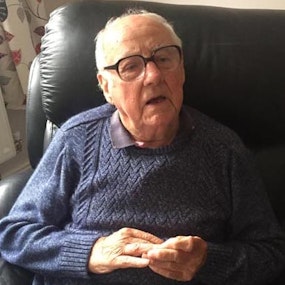
Claude Reynolds
Lancaster Rear Gunner. Norfolk UK. RIP.
Featured Episodes
If you're going to binge, best start at No 1, Dunkirk, the most popular episode of all. Welcome! Paul.
PS. Just swipe left to browse if you're on mobile.










